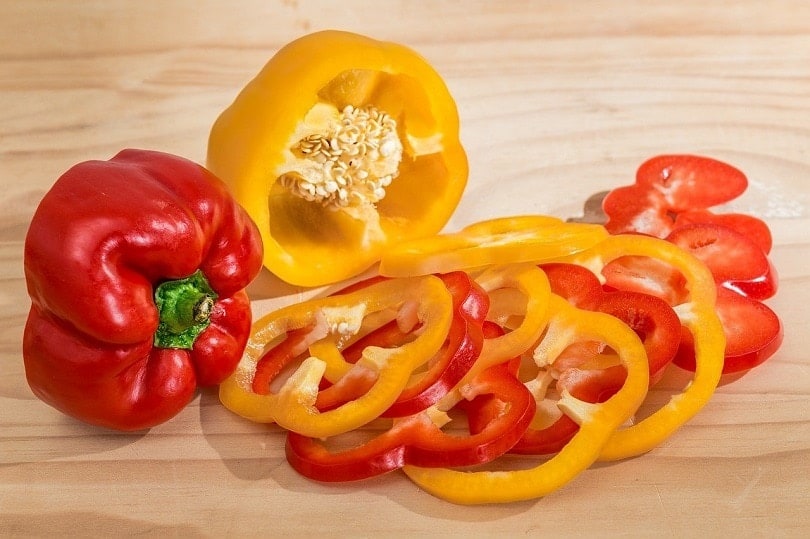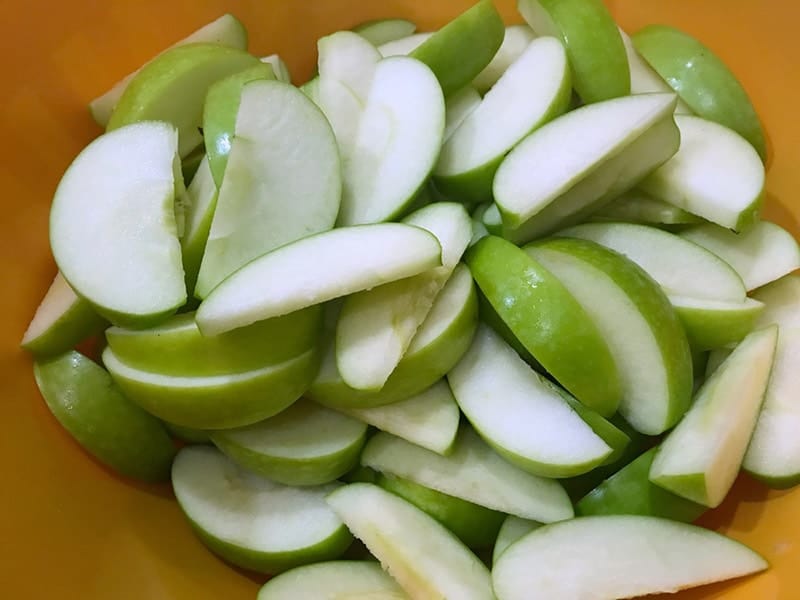Approved by Dr. Paola Cuevas
If you’re new to keeping backyard chickens, it can be tricky to know exactly what they can and can’t eat. Bell pepper is but one of the many healthy vegetables and fruits you can give your chickens to munch on as it contains a variety of nutrients beneficial to them. In this post, we’ll share why including bell peppers in your chickens’ diets and give you a heads up as to other foods you can safely give your chickens.

Are Bell Peppers Good for Chickens?
Yes, raw bell peppers are very good for chickens. For one thing, bell peppers are a source of vitamin A and vitamin C, both of which help hens immune system, helping to make them less susceptible to infections. They also have high water content and are a great source of antioxidants, potassium, folic acid, and fiber, all of which help chickens to thrive. Avoid the stem, flowers, and leaves of pepper plants, though, and only feed the fruit, seeds, and core.

Can Chickens Eat Bell Peppers in All Colors?
There’s a little controversy surrounding which colors of bell pepper chickens can safely eat. When it comes to feeding bell peppers to chickens, the riper the better, so go for red, orange, and yellow bell peppers as these are more nutritious.
There has been a little controversy surrounding which colors of bell pepper chickens can safely eat. Some chicken owners stay away from green peppers due to concerns about the presence of solanine, which can be toxic to chickens and even fatal in large amounts. However, it seems that many do feed green peppers to their chickens without issue.
To clear this up, we did some digging to see if we could get hold of an expert opinion on the safety of green peppers. According to plant biochemistry expert Barry Micallef, peppers do not produce solanine and are safe to eat.
Some parts of the pepper plant are toxic, though—the stem, leaves, and flowers can make chickens sick. Fortunately, the pepper fruit, seeds, and core are fine. Though, of course, they’re not going to eat the core, it can even be quite fun for them to try and get the seeds from it, which offers a bit of mental stimulation.
What Else Can I Feed My Chickens?
Plenty of things! Chickens are omnivores, which means they can eat both meat and plant matter. In the wild, chickens tend to seek out insects, worms, and grubs to get their protein. As for their plant intake, they eat vegetation, seeds, and grass.
If you allow your chickens to roam in your backyard, they’re sure to have a jolly old time seeking out grubs and tasty seeds to peck at. Check out this list of foods you can safely feed your chickens—they’ll greatly appreciate it. Remember to feed certain fruits, like watermelon, strawberries, and blueberries in moderation.
- Poultry feed
- Mealworms
- Berries
- Broccoli
- Bok choy
- Apples
- Shelled sunflower seeds
- Strawberries
- Watermelon
- Squash
- Pumpkin
- Beets
- Kale
- Cucumber
- Carrots
- Blueberries
- Lettuce
- Swiss chard

What To Avoid Feeding Chickens
As well as the stems, leaves, and flowers of bell pepper plants, there are some other food items you should avoid feeding your chickens. They include:
- Avocado pits
- Avocado skins
- Dried beans
- Garlic
- Onions
- Undercooked beans
- Salty foods
- Rhubarb
- Citrus
- Highly processed foods
- Chocolate
- Candy
- Green potato skins
- Moldy food

Final Thoughts
In summary, feel free to feed your chickens bell peppers as they’re packed with nutrients that can benefit them—especially red peppers—but you should always avoid feeding the stem, leaves, and flowers of a pepper plant, which are toxic. Luckily, chickens aren’t the pickiest of animals and also enjoy a wide variety of other fruits and vegetables, including broccoli, apples, watermelon, strawberries, and protein sources like mealworms.
